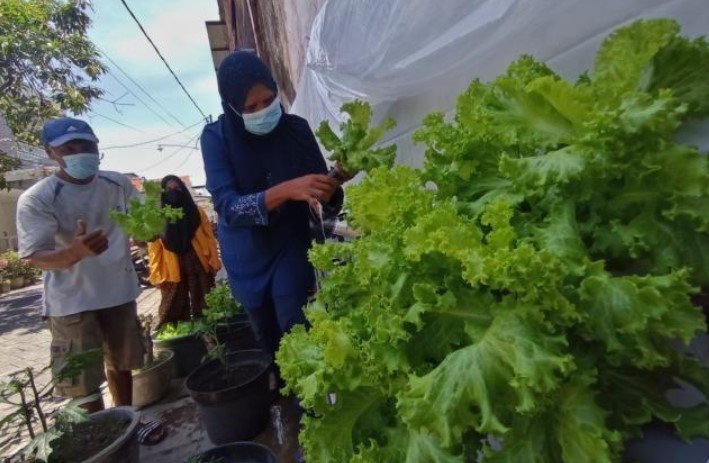Department of Physics Prof. Dr. Sunaryono, M.Si Prof. Dr. Markus Diantoro, M.Si Prof. Dr. Ahmad Taufiq, M.Si August 26, 2023 Research/Penelitian, SDG 6. Clean water and sanitation SDG 14. Life below water
In recent years, whether in densely populated villages or cities, flooding has become one of the problems faced, due to lack of drainage which makes it difficult for water to be absorbed into the ground. According to the Badan Penanggulangan Bencana Daerah (BPBD), several areas are prone to flooding. One of the areas prone to flood disasters is the Gadingkasri sub-district, Klojen District, Malang City. You can see Figure 1 which is a photo of the condition of one of the alleys in the Gadingkasri sub-district which is densely populated. After a site survey was carried out, drainage and absorption land were still very lacking so in this alley there were frequent puddles of water and even flooding when rainfall was high.
The sub-district officials are aware of this and have made several efforts to overcome flooding and achieve independent food security by reforesting empty land as shown in Figure 2. However, the flooding problem has not been resolved with the existence of these plantations. Apart from that, the plants in the plantation also need lighting to warm the plants. This problem is related to the sustainable goals of Sustainable Development Goals (SDGs) point 6 regarding clean water and sanitation and SDG 14 life below water. The research was carried out by a team of physics lecturers, Department of Physics, FMIPA UM by developing biopori-smart light absorption holes. Infiltration holes are one of the vital facilities needed in a city structure to help channel water into the ground. This research starts from May – August 2023. On 18 – 19 August 2023, the Biopori-smart light was installed in RW 03, Gadingkasri Village, Klojen District, Malang City. The installation activity was carried out over several days because there were quite a lot of installation locations. The activity began with a symbolic handover procession of a set of Biopori-smart lights and the signing of a dedication document. Then the activity continued with an explanation of the technical installation by Prof. Sunaryono to all residents of the urban farming community who helped install the Solar-powered Smart Light-Biopori. Next, the activity continued with practicing how to install Solar-powered Smart Light-Biopori by the service team. Then the installation process began to be carried out jointly by the urban farming community and the service team. Finally, the activity closed with a trial operation of the Solar-powered Smart Light-Biopori and an explanation of how to care for the Solar-powered Smart Light-Biopori.
![]()

